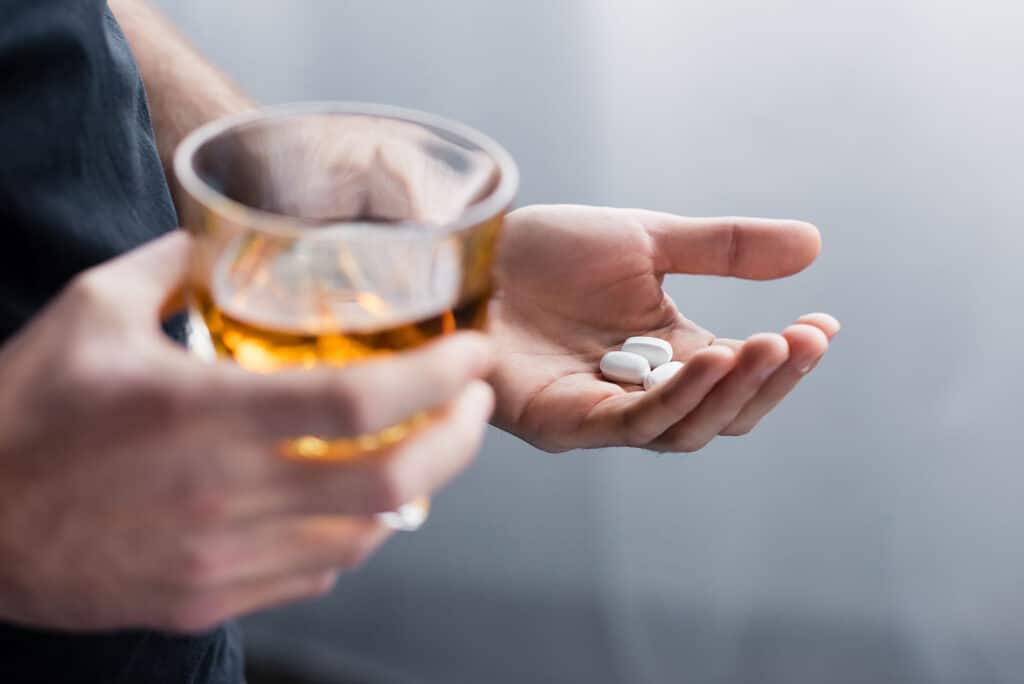Aleve is one of the most commonly used medications out there because of its wide range of uses while not requiring a prescription to purchase.
In fact, the drug is often dubbed one of the safest pain medications used to treat various symptoms including headaches, menstrual cramps, muscle aches, and fever.
But despite its safety, they can interact with various drugs and cause serious side effects if you’re not careful. For example, combining Aleve and alcohol together is often regarded as safe despite causing several health problems.
Keep on reading to find out more about the risks associated with combining the two drugs and how they affect your health.

Table of Contents
- A Brief Overview of Aleve and How it Works
- How Does Alcohol Use Affect the Body?
- What Are the Risks Associated with Combining Aleve with Alcohol?
- Is Aleve a Suitable Hangover Medication?
- Why Do Many People Use the Two Drugs Together?
- Are There Alternatives to Aleve?
- Final Thoughts: Seeking Alcohol Addiction Treatment in Illinois
A Brief Overview of Aleve and How it Works
Aleve is a brand name for a well-known painkiller containing naproxen sodium as its active ingredient. The same active ingredient is present in competitor treatments, such as Naprosyn.
This active ingredient falls under the category of non-steroidal anti-inflammatory drugs, or (NSAIDs) for short.
These are a broad group of medications commonly used to manage pain relief and reduce inflammation, including popular drugs like acetaminophen (Tylenol), ibuprofen (Advil), etc.
Like many other drugs in this class, Aleve is available as an over-the-counter medication, also known as OTC drugs. This means you can buy and use it without needing a prescription from a doctor.
The main use of Aleve is to treat painful inflammation associated with rheumatoid arthritis, but its scope has extended to include a variety of minor health conditions and ailments, such as:
- Menstrual cramps
- Headaches and mild migraines
- Back pain
- Toothaches
- Joint pain and stiffness
- Fever-induced Muscle aches
Does Aleve Have Side Effects?
Although the pain reliever’s safety profile is one of its main selling points, it’s also worth noting that it can still have some side effects and adverse reactions. The good news is that most of these effects are rare and minor, including:
- Indigestion
- Constipation
- Nausea
- Bloating
The drug is also associated with riskier side effects like bleeding gums and chest pain. However, these are extremely rare and associated with allergic reactions to naproxen.
Besides the primary and secondary side effects, it can also interact with some other drugs, which results in undesired adverse reactions.
What Is the Mechanism of Action of Aleve?
As previously established, Naproxen belongs to the NSAID class of drugs. These medications work mainly by reducing the levels of prostaglandins, which are chemicals in the body involved in various functions, including inflammation, fever, and pain.
Naproxen functions through inhibiting a group of enzymes called cyclooxygenases or COXs. These enzymes are responsible for various processes, including the production of previously mentioned prostaglandins.
However, we have two main types of COX enzymes in our bodies, which are COX 1 and COX 2, each one of them has its own functions and properties.
COX 1 is found in various soft tissues of the body, including the intestine and stomach lining, and isn’t heavily associated with prostaglandins.
On the other hand, COX 2 is produced in response to injury or inflammation, as it’s the type of COX enzyme responsible for the production of prostaglandins that cause pain.
Naproxen is a non-selective inhibitor of COX enzymes, so it inhibits both type 1 and 2. This is why it can be effective in reducing pain, fever, and inflammation.
However, inhibiting COX 1 enzyme is why the drug is also associated with some unwanted side effects, such as stomach ulcers and heartburn.

How Does Alcohol Use Affect the Body?
Alcohol is one of the most commonly used CNS depressants. In other words, it slows down multiple brain functions, including reaction time, thinking patterns, speech, balance, and coordination.
The effects of alcohol consumption are almost immediate, as the liquid is quickly absorbed into the bloodstream where it crosses the blood-brain barrier.
That’s why even drinking minimal amounts of alcohol can make you experience drowsiness and impairment of judgment. This effect becomes more intense as you increase the amount of alcohol you consume.
Your liver starts breaking down alcohol right away, but it’s bound by a certain filtration limit. As a result, alcohol is one of the most common reasons behind liver damage and cirrhosis. This process can also be further slowed by other medications.
Beyond the liver, heavy and/or long-term drinking can lead to other problems. For example, it can raise your blood pressure and increase the risk of heart attacks. Additionally, it can also irritate the esophagus and stomach, causing stomach bleeding.

What Are the Risks Associated with Combining Aleve with Alcohol?
Using Aleve while drinking alcohol is generally not recommended and there’s a warning on the drug’s label not to use the two drugs at the same time. Here’s an in-depth look at the two main reasons why you should avoid this combination:
Gastrointestinal Bleeding
As previously established, gastrointestinal problems are among the most common side effects associated with both Aleve and alcohol.
For that reason, issues like stomach ulcers and irritation of the stomach lining can be the fastest adverse effects that result from combining the two drugs.
In fact, these ulcers can even develop into more serious problems, such as gastritis. Inflammation of the stomach is characterized by severe stomach pain, indigestion, and a high risk of gastric bleeding.
In rare cases, gastritis can even lead to extremely dangerous side effects, such as stomach cancer.
Increased Risk of Serious Liver Diseases
Aleve and alcohol both put stress on your liver and taking them together can significantly increase your risk of developing serious liver problems.
Both Aleve and alcohol need to be processed by your liver, either partially or mainly. The combination of the two drugs puts extra stress on your liver, which increases the rate of liver cell damage over time.
Of course, these adverse reactions can vary depending on your initial liver health. However, with increased alcohol consumption, liver damage becomes more prominent, which affects naproxen metabolism and leads to further toxicity.
Potential Kidney and Other Organ Damage
Your kidneys filter waste and keep your body’s fluids balanced. Although alcohol is mainly metabolized by the liver, it still causes a massive impact on the health of your renal system.
For starters, alcohol can throw off your electrolytes balance, which are minerals your body needs to stay healthy.
Additionally, it can disrupt your body’s acid-base balance, which not only affects your gastrointestinal system but also the blood’s pH level.
Moreover, as previously mentioned, alcohol makes you severely dehydrated by increasing urination. The lack of fluids during filtration puts a lot of extra work on the kidneys, especially if you already suffer from kidney problems.
Meanwhile, most NSAIDs, including Aleve, are processed mainly by the kidneys. The disruption of alcohol, combined with the strain of drugs on kidney functions, can result in renal damage and even renal failure.
Renal failure can lead to further organ damage and may even develop into cardiovascular issues like high blood pressure and heart failure, as the two systems are heavily linked.

Is Aleve a Suitable Hangover Medication?
One of the most annoying side effects of overdoing alcohol is suffering from hangovers as the drug wears off. This severe headache and extreme weakness are the result of dehydration, disrupted sleep, and inflammation.
For that reason, many people might consider using Aleve as a treatment for hangovers. But as previously mentioned, combining Aleve and alcohol usually comes with unwanted side effects, and since alcohol is usually still present in your system during a hangover, it’s best to avoid the drug altogether and use other remedies, such as hydration.
Why Do Many People Use the Two Drugs Together?
As a general rule, you should separate Alcohol and alcohol to avoid the unwanted side effects of combining them.
Since it takes around 12 to 24 hours for either drug to be fully eliminated from your body, this should be the ideal waiting time between them.
That being said, a wide range of other factors can also affect this waiting time, either by extending or shortening it. For example, those with reduced liver or kidney performance should wait up to 36 hours to ensure complete elimination before consuming alcohol or Aleve.
It’s also worth noting that individuals suffering from compromised liver are advised against consuming any alcohol at all, so make sure that you consult a qualified healthcare professional if you suspect any signs of liver problems.
Are There Alternatives to Aleve?
If you want to avoid the risk of stomach bleeding associated with Aleve, you may switch to acetaminophen while treating minor pain.
However, you should note that Tylenol and other acetaminophen-containing medications are mainly metabolized by the liver, so you should still avoid taking these drugs while under the influence of alcohol.

Final Thoughts: Seeking Alcohol Addiction Treatment in Illinois
In addition to the risks associated with combining alcohol with Aleve, you should note that excessive drinking has the potential for addiction as alcoholism is one of the most prevalent forms of substance abuse across the nation.
If you or a loved one is struggling with alcohol addiction, don’t hesitate to contact Illinois Recovery Center to receive immediate support.



